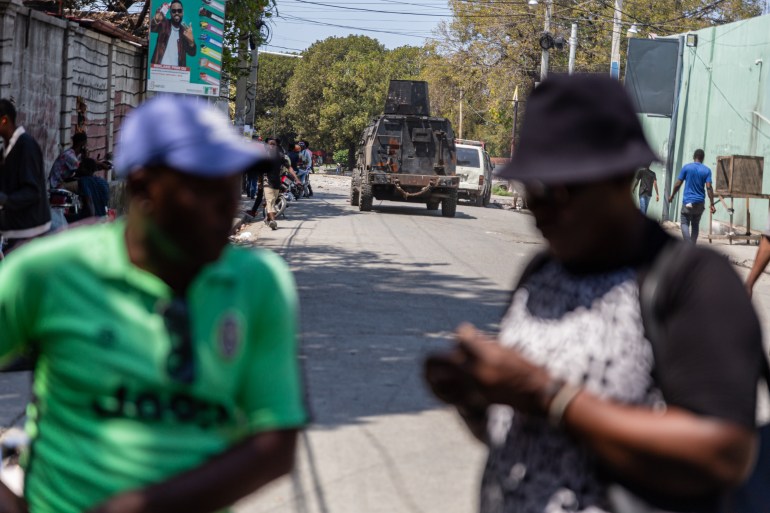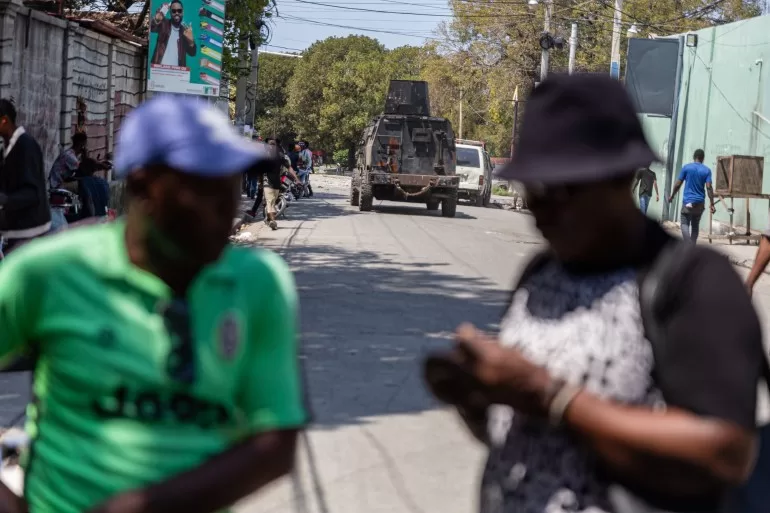The announcement came late on Monday after the United States urged him to step aside and usher in a transitional political process to stem the unrest.
Haitian civil society leaders welcomed the resignation of Henry, an unelected leader who was named to his post in 2021 shortly before the assassination of President Jovenel Moise, as a long overdue step.
But many are now questioning what comes next. For years, the country has been plagued by corrupt leaders, failed state institutions and violence wrought by rival armed groups, and federal elections have not been held.
“First of all, we have to say that we think this is a good thing,” Rosy Auguste Ducena, a lawyer and programme director at Haiti’s National Human Rights Defense Network (RNDDH), said of the prime minister stepping down.
Yet Ducena told Al Jazeera in a phone interview from Port-au-Prince on Tuesday morning that his announcement did little to stem the anxiety and fear on the ground.
The West Department, which encompasses the capital city, remained “very tense” after days of gang violence, she said. “The streets continue to be empty.”
Since late February, Haitian armed groups have launched attacks on police, prisons and other state institutions. The main airport in Port-au-Prince has been shut down, and residents have been afraid to leave their homes to get water, food and other supplies.
“Today again, we have the impression that the West Department is holding its breath because we don’t really know what’s going to happen,” Ducena added.
Transitional council
The answer to that question — what happens next? — remains unclear.
The leaders of Haiti’s armed groups, one of whom had said the country would face a “civil war” if Henry did not resign, have yet to comment on the prime minister’s announcement.
And it is uncertain whether Henry’s promise to step down after a transitional presidential council and his replacement are chosen will be enough to get the groups to lay down their arms.
Jimmy Cherizier, a former police officer known as Barbecue who leads Haiti’s powerful G9 gang alliance, said before Henry’s statement that he rejected any proposal led by the international community.
The resignation came after a group of Caribbean nations known as CARICOM held an emergency meeting on Monday to set out the terms of Henry’s departure, which will come into effect after the “establishment of a transitional presidential council and the naming of an interim prime minister”.
Jake Johnston, a Haiti expert and senior research associate at the Center for Economic and Policy Research (CEPR) in Washington, DC, said CARICOM’s announcement “is unlikely to lead to a solution to the current crisis by itself”.
“After criticising Henry for relying on the support of the US and other foreign powers, an agreement pushed by those same foreign powers is likely to face legitimacy concerns from the moment it forms,” Johnston wrote on Tuesday in a post to CEPR’s website.
“Though negotiations have been taking place for the better part of a week, none of the participants or discussions has been made public, leaving the vast majority of Haitians in the dark.”
According to CARICOM’s statement, the transitional council will be composed of seven voting members picked from across Haitian society, including the private sector and various political factions. Two non-voting members will also be chosen, from civil society and religious groups.
US Department of State spokesman Matthew Miller told reporters on Tuesday afternoon that Washington expects the members of the council to be appointed within 24 to 48 hours.
“And then they will take the step to appoint an interim prime minister in the near future after that,” Miller said.
But CARICOM’s statement tied participation in the process to support for a proposed international security mission to Haiti, led by Kenya and backed by the United Nations.
CARICOM indicated that anyone opposed to the Kenya-led mission would be excluded from the transitional council, raising more questions about who is dictating the country’s political transition.
Some Haitian civil society leaders have previously raised concerns about the prospect of a multinational force in Haiti, stressing that safeguards need to be in place to avoid crises wrought by past foreign interventions.
Kenyan officials, meanwhile, have told news outlets such as Reuters and the New York Times that any police deployment from their country is on hold following Henry’s resignation.
“It was US and foreign support for Henry that pushed the situation to its dire state,” said Johnston.
“But rather than letting a truly Haitian-led process play out, those same foreign powers have opted for a stability pact that, it would seem, is likely to lock in an unsustainable status quo at least in the short term.”

‘Should never have come to this point’
Most analysts and experts agreed that it is important to understand how Haiti got to this point, in order to chart a path forward.
Marlene Daut, a professor of French and African American studies at Yale University, stressed that the unelected Henry should never have had the backing of Washington, the UN and other Western powers to begin with.
The prime minister was handpicked for his post shortly before President Moise was assassinated in July 2021. From the very start of his tenure, Henry faced calls to step down in favour of a representative council that would guide Haiti to elections — but he refused. He has served as Haiti’s de facto president amid the political stalemate.
“It should never have come to this point,” Daut told Al Jazeera on Tuesday. “Because either the United States, the CORE Group [and] the UN believe in democracy, which is what they say — or they don’t.
“And if they believe in democracy — that is, the participation of the populace in their own governance through elected officials — then they would never have supported an unelected person taking office.”
Daut stressed that Haitians living in Haiti need to be “involved at every step” of the political process. “And the US and the CORE Group and the UN and these transition councils … need to take their lead from people in Haiti who are trusted in Haiti by the Haitian people,” she added.
“Whatever happens next needs to be based on the will of the Haitian people.”
Avoid pitfalls of past governments
Much of the violence has been centred in the Haitian capital of Port-au-Prince, where the UN has estimated that gangs control 80 percent of the city.
Speaking to Al Jazeera from Port-au-Prince on Tuesday, Laurent Uwumuremyi, the Haiti director at humanitarian group Mercy Corps, said, “The most pressing need is to restore security.”
Uwumuremyi explained that people may go hungry, as the city is at “a standstill” amid the unrest.
“In Port-au-Prince, we have more than 200,000 people who are internally displaced,” he said. “They need support, they need food, they need water. But if there’s no access, if people can’t circulate normally, the situation will deteriorate very rapidly.”
According to Ducena, the human rights advocate in Port-au-Prince, it is critical that the next Haitian government take a rights-based approach and avoid a pattern of poor governance employed by its predecessors.
She explained that, for years, Haitian political leaders have maintained ties to armed groups in an effort to maintain their grip on power. “We hope that the next government will not use this same strategy of poor governance,” she told Al Jazeera.
Ducena said Haiti also needs to put programmes in place to support survivors of the violence that has engulfed the country since Moise’s 2021 assassination. This includes allowing victims to go back to homes seized by armed groups, as well as reparations.
She also urged foreign countries involved in discussions about Haiti’s political transition “to show lucidity and above all, morality” in decisions on which individuals will be allowed to take part in that process.
“Here in Haiti, we can’t afford to have just anyone in power once again.”
